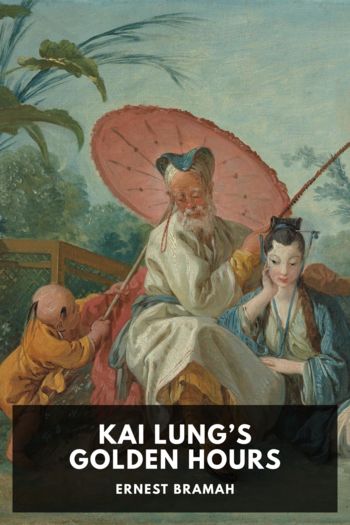Kai Lung’s Golden Hours - Ernest Bramah (the reading strategies book .TXT) 📗

- Author: Ernest Bramah
Book online «Kai Lung’s Golden Hours - Ernest Bramah (the reading strategies book .TXT) 📗». Author Ernest Bramah
Thus was Tian positioned outside the city of Ti-foo, materially contributing to its ultimate surrender by the resourceful courage of his arms. For the first time in the history of opposing forces he tamed the strength and swiftness of wild horses to the use of man, and placing copper loops upon their feet and iron bars between their teeth, he and his band encircled Ti-foo with an ever-moving shield through which no outside word could reach the town. Cut off in this manner from all hope of succour, the stomachs of those within the walls grew very small, and their eyes became weary of watching for that which never came. On the third day of the third moon of their encirclement they sent a submissive banner, and one bearing a written message, into the camp of Ah-tang.
“We are convinced” (it ran) “of the justice of your cause. Let six of your lordly nobles appear unarmed before our ill-kept Lantern Gate at the middle gong-stroke of tomorrow and they will be freely admitted within our midst. Upon receiving a bound assurance safeguarding the limits of our temples, the persons and possessions of our chiefs, and the undepreciated condition of the first wives and virgin daughters of such as be of mandarin rank or literary degree, the inadequate keys of our broken-down defences will be laid at their sumptuous feet.
“With a fervent handclasp as of one brother to another, and a passionate assurance of mutual goodwill,
“Ko’en Cheng,
“Important Official.”
“It is received,” replied Ah-tang, when the message had been made known to him. “Six captains will attend.”
Alas! it is well written: “There is often a space between the fish and the fishplate.” Mentally inflated at the success of their efforts and the impending surrender of Ti-foo, Tian’s band suffered their energies to relax. In the dusk of that same evening one disguised in the skin of a goat browsed from bush to bush until he reached the town. There, throwing off all restraint, he declared his errand to Ko’en Cheng.
“Behold!” he exclaimed, “the period of your illustrious suffering is almost at an end. With an army capable in size and invincible in determination, the ever-victorious Wu Sien is marching to your aid. Defy the puny Ah-tang for yet three days more and great glory will be yours.”
“Doubtless,” replied Ko’en Cheng, with velvet bitterness: “but the sun has long since set and the moon is not yet risen. The appearance of a solitary star yesterday would have been more foot-guiding than the forecast of a meteor next week. This person’s thumb-signed word is passed and tomorrow Ah-tang will hold him to it.”
Now there was present among the council one wrapped in a mantle made of rustling leaves, who spoke in a smooth, low voice, very cunning and persuasive, with a plan already shaped that seemed to offer well and to safeguard Ko’en Cheng’s word. None remembered to have seen him there before, and for this reason it is now held by some that this was Leou, the Whisperer, perturbed lest the sacred nail-sheaths of Ning should pass beyond his grasp. As to this, says not the Wise One: “When two men cannot agree over the price of an onion who shall decide what happened in the time of Yu?” But the voice of the unknown prevailed, all saying: “At the worst it is but as it will be; perchance it may be better.”
That night there was much gladness in the camp of Ah-tang, and men sang songs of victory and cups of wine were freely passed, though in the outer walks a strict watch was kept. When it was dark the word was passed that an engaging company was approaching from the town, openly and with lights. These being admitted revealed themselves as a band of maidens, bearing gifts of fruit and wine and assurances of their agreeable behaviour. Distributing themselves impartially about the tents of the chiefs and upper ones, they melted the hours of the night in graceful accomplishments and by their seemly compliance dispelled all thought of treachery. Having thus gained the esteem of their companions, and by the lavish persuasion of bemusing wine dimmed their alertness, all this band, while it was still dark, crept back to the town, each secretly carrying with her the arms, robes and insignia of the one who had possessed her.
When the morning broke and the sound of trumpets called each man to an appointed spot, direful was the outcry from the tents of all the chiefs, and though many heads were out-thrust in rage of indignation, no single person could be prevailed upon wholly to emerge. Only the lesser warriors, the slaves and the bearers of the loads moved freely to and fro and from between closed teeth and with fluttering eyelids tossed doubtful jests among themselves.
It was close upon the middle gong-stroke of the day when Ah-tang, himself clad in a shred torn from his tent (for in all the camp there did not remain a single garment bearing a sign of noble rank), got together a council of his chiefs. Some were clad in like attire, others carried a henchman’s shield, a paper lantern or a branch of flowers; Tian alone displayed himself without reserve.
“There are moments,” said Ah-tang, “when this person’s admitted accomplishment of transfixing three foemen with a single javelin at a score of measured paces does not seem to provide a possible solution. Undoubtedly we are face to face with a crafty plan, and Ko’en Cheng has surely heard that Wu Sien is marching from the west. If we fail to knock upon the outer gate of Ti-foo at noon today Ko’en Cheng will say: ‘My word returns. It





Comments (0)